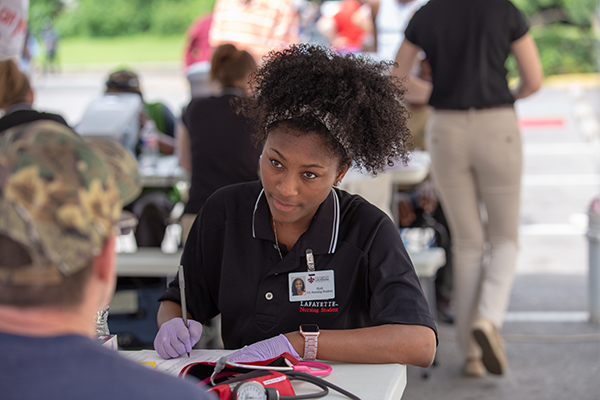The University of Louisiana at Lafayette College of Nursing & Health Sciences has restored a third concentration within its M.S. in Nursing degree program to meet the rising demand for mental health care providers.
Licensed registered nurses can now apply to the MSN – Psychiatric Mental Health Nurse Practitioner concentration, as well as Family Nurse Practitioner and Nursing Education concentrations, for Fall 2022 admission.
According to the U.S. Department of Health and Human Services, more than 7,000 practitioners are needed nationwide to meet communities' needs for psychiatric mental health care.
“UL Lafayette is positioned within a state and a region with some of the highest healthcare provider shortage areas in the country. Addressing these shortages to improve the health and wellbeing of Louisiana is core to our mission as a college,” said Dr. Melinda Oberleitner, dean of the College of Nursing & Health Sciences.
“Preparing nurse practitioners to face these challenges and provide care to underserved communities is central to how we achieve that mission.”
The psychiatric mental health nurse practitioner concentration prepares nurses to take an integrated behavioral healthcare approach to assess, diagnose, and develop treatment plans for patients, from childhood through adulthood.
Psychiatric mental health certified nurse practitioners can provide treatment – including therapy or medication – through telehealth, hospitals, treatment centers, or their own clinics.
Dr. Abby McNeil, an assistant professor in the college’s LHC Group • Myers School of Nursing, will teach in the psychiatric mental health nurse practitioner program. She is dual certified as a family nurse practitioner and psychiatric mental health nurse practitioner and has spent most of her career as a practitioner and educator focused on increasing mental health care access.
“It's so important that we educate and get trained psych mental health nurse practitioners into the field so that we can see more patients because access just isn't there the way it should be,” McNeil said.
“As PMHNPs, our main goal is to provide optimal care to that patient who has mental health issues or illness. When they come in, we’re assessing, evaluating, and developing a plan of care in combination with them, and then implementing that plan of care.”
The 48-credit-hour psychiatric mental health nursing program includes online advanced practice nursing coursework in theory, pharmacotherapeutics, evidence-based practice approaches, health policy, and primary care, as well as specific courses in psychiatric mental health advanced practice including diagnosis, psychopharmacology, and psychotherapy.
Students also must complete a minimum of 600 precepted, direct patient care clinical hours in Louisiana.
“When these nurses graduate, they can expect to use everything they learned in getting their education,” McNeil said. "When you're approaching someone who has psychiatric illness, you have to take a holistic approach and look at their whole body.”
Licensed registered nurses interested in specializing in psychiatric and mental health care can learn more and request information by visiting the program page.
Photo caption: UL Lafayette’s College of Nursing & Health Sciences' new MSN – Psychiatric Mental Health Nurse Practitioner concentration is designed to meet the rising demand for mental health care providers. The concentration will prepare nurses to take an integrated behavioral healthcare approach to assess, diagnose, and develop treatment plans for patients. (Photo credit: University of Louisiana at Lafayette)
